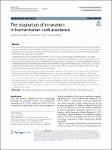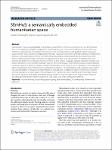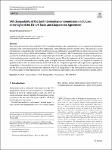Search
Author
- Cooper, Davina (2)
- Eidenmüller, Horst (2)
- Emad, Gholam Reza (2)
- Fiorato, Sidia (2)
- next >
Subject
- Vulnerability (3)
- CJEU (2)
- COVID-19 pandemic (2)
- Criminal Law (2)
- next >
Date issued
Has File(s)
Search Results
When addressing corporate sustainability challenges, artificial intelligence (AI) is a double-edged sword. AI can make significant progress on the most complicated environmental and social problems faced by humans. On the other hand, the efficiencies and innovations generated by AI may also bring new risks, such as automated bias and conflicts with human ethics. We argue that companies and governments should make collective efforts to address sustainability challenges and risks brought by AI. Accountable and sustainable AI can be achieved through a proactive regulatory framework supported by rigorous corporate policies and reports. |
This article maps the development of Czech corporate law after 1989 against the backdrop of the gradual change of private law and its paradigms as well as considering especially the influence and use of corporate governance soft law. It describes some of the economic, political and social reasons that slowed down or marginalized the relevance of OECD Corporate Governance Principles after the transition of Czechoslovakia and later the Czech Republic to democratic law. At the same time, the article attempts to show that while the gradual recodification of corporate law, in particular corporate governance rules, did not provide much support for the use of corporate governance codes, it nevertheless reflected the relevant rules and recommendations for statutory rules, thus, partially at... |
Legal institutions worldwide construct theories about gender’s ontology—i.e., theories about what gender is—and use those constructions to govern. In this article, I analyse how the Family Court of Australia constructed ontologies of gender to govern young people’s gender-affirming hormone use. By analysing the ‘reasons for judgment’ published about cases where minors applied for the Court’s authorisation to use hormones, I show that the Court constructed two theories about the ontology of gender concurrently—one essentialist and the other performative—which it leveraged to arbitrate the legitimacy of hormone use. By critically examining the Court’s ontological assertions, I argue that both theories advanced anti-queer directives that tethered the legitimacy of hormone use to its pr... |
Cash and voucher assistance (CVA) has been gaining traction among humanitarian organizations as the preferred aid modality in disaster relief and complex emergencies. While the advantages of cash are well documented, the ongoing digitalization of cash and the emergence of innovative financial instruments can be associated with new operational challenges and a stagnation in innovation. |
This paper aims to classify and assess the impact of charter party clauses against the contractual terms of marine insurance contracts. Initially, a contractual term may be classified as a condition, a warranty, or an innominate term when the nature of a clause is not yet classified. Based on this classification, the effectiveness of those terms and the available remedies vary significantly upon a contractual dispute or termination. Specifically, the classification of a term as a condition has similar effects in charter parties and insurance contracts, namely, the termination of the contract and/or claim for damages. Nevertheless, the marine insurance conditions also rely on the claim’s seriousness to effectively provide the election of contractual termination, thus rendering them r... |
Humanitarian crises are unpredictable and complex environments, in which access to basic services and infrastructures is not adequately available. Computing in a humanitarian crisis environment is different from any other environment. In humanitarian environments the accessibility to electricity, internet, and qualified human resources is usually limited. Hence, advanced computing technologies in such an environment are hard to deploy and implement. Moreover, time and resources in those environments are also limited and devoted for life-saving activities, which makes computing technologies among the lowest priorities for those who operate there. In humanitarian crises, interests and preferences of decision-makers are driven by their original languages, cultures, education, religions... |
This article discusses the Value-Added Tax (VAT) discipline relating to the representation services offered by football intermediaries in the contractual negotiation of the employment contract between the player and the club(s). The analysis is carried out taking into consideration the relevant legislative provisions of European Union (EU) law as well as the case law of the European Court of Justice (ECJ) and the findings of the EU VAT Committee. The VAT discipline of representation services provided by football intermediaries is first analyzed in light of the EU legislative acts regulating the different legal figures of intermediation contracts and the effects on the EU internal market. Then, the legal nature of the “intermediation commission”—as the VAT chargeable event—and the “p... |
The Coloniality of Contemporary Human Rights Discourses on ‘Honour’ in and Around the United Nations In United Nations (UN) human rights reporting and analysis, ‘honour’ has been systematically conflated with ‘honour-related violence’ (HRV). However, honour and HRV are not the same thing. In this article I examine contemporary UN human rights discourses around honour. I argue that these discourses are underpinned by racialised and orientalist-colonial imaginaries which falsely categorise people and places as either having or not having honour. This conflation presents honour as a cultural problem attributed to racialised communities mostly associated with the Muslim World. Adopting a critical post- and de-colonial perspective, I undertake a discourse analysis of UN human rights documents to expose orientalist tropes that reproduce epistemic and material violence against honour. |
Several major initiatives have been undertaken worldwide towards the development and commercialisation of maritime autonomous surface ships (MASSs). This study aims at capturing the current understanding and perspectives of the maritime industry stakeholders pertinent to the challenges and requirements for the design and operation of MASSs. A methodological approach consisting of five steps is followed. A questionnaire is developed and employed to conduct two surveys among the identified maritime industry stakeholders. Subsequently, the acquired response results are analysed, whereas statistical metrics are calculated and comparatively assessed using the box plot method, to provide evidence for identifying the perspectives and gaps from the considered stakeholders’ groups. Recommend... |
The education and training for the maritime industry require renewed focus in the face of technological changes and increasing digitalization. Artificial intelligence presents an avenue for further research that can positively impact efficiency and competence development. Among many applications of artificial intelligence in education, conversational agents or chatbots have gained increased interest in recent years. This paper describes the design and implementation process of “FLOKI”—a chatbot aimed at assisting maritime trainees in learning Collision Avoidance Regulations (COLREGs). For the design of the chatbot, IBM Watson Assistant®—a cognitive computing service—was utilized, which enables the use of Application Programming Interfaces (APIs) in its cloud server. A selected numbe... |










